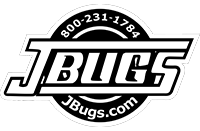




Your cart is currently empty.
Hi i'm Sam with JBugs.com. With the
engine from our 1971 Volkswagen Type 3 Squareback pulled out, it's time to tear
it down to the long block so we can diagnose the issue and repair the engine. Immediately,
we can see the first error that may have caused some of the problems. As we
have mentioned before, the original fuel injection, stock muffler, and heater
boxes have been replaced with dual carbs, a header system and J-tubes. The
heater ducts from the fan shroud were not blocked off when the heater boxes
were removed. This caused the engine to overheat, as the air will follow the
path of least resistance. Instead of the air being pushed through the
cylinders, heads, and oil cooler, most of it was leaving through the ducts and
not cooling the engine.
We start the disassembly by removing
the nuts at both the J-tubes, loosening the header clamps, and removing the J-tubes. The header nuts at both heads are removed, so we can pull off the
header and muffler assembly. Next the carburetors and linkage can be pulled off
by un-threading the nuts at the intake manifolds at both heads. With the left,
or 3 /4 side, carb off, we can see a problem with the number three cylinder. The
intake track is covered in carbon which means the intake valve has been opened allowing
exhaust gasses to build up on the intake.
Continuing with the tear down, we
remove the coil, followed by the engine intake cover bolts. The generator belt
is worn so we cut it and removed the intake cover. The generator strap is
unbolted so the generator can be removed. [The] distributor clamp nut is pulled
off the engine case and the distributor and clamp are pulled out. The multiple
sheet metal screws are removed from the cylinder shrouds so they can be pulled
off and now the oil cooler can be removed.
Next, a flywheel lock is bolted to
the case and the crank pulley nut is removed so that the crank pulley can be
pulled off. The coil bracket and the front fan shroud bolts can be unbolted so
the front fan shroud cover can be removed. A pulley puller is used to pull off
the crankshaft fan, and the rear fan shroud can be unbolted from the oil filler
tower and engine. The left and right cylinder deflect tins can be pulled off and
the rear engine cross brace can be unbolted from the engine case. The oil
filler tower is unbolted from the case, and pulled up while the breather tube
is pulled off the dipstick tube.
With that, all the engine tin
accessories are removed. In our next video we will get the engine mounted to a
stand so we can get it off the ground and we will pull the cylinder heads and
see what needs to be done to get the engine running back in the car and back on
the road again. Thanks for watching and remember to stop by JBugs.com the next
time you need parts or accessories for your vintage VW.
Copyright © JBugs.
All rights reserved. All images protected by US and International copyright laws. No part of this website may be reproduced, distributed, or transmitted in any form or by any means.
All Prices subject to change without notice or obligation. Not responsible for typographical or photo errors. "Volkswagen", "VW","Beetle", "Super Beetle", "Bus", "Ghia", "Type 2", "Type 3", "Thing", "Rabbit", "Cabriolet", "Jetta", and "Golf" are trademarked by Volkswagen of America and are used for descriptive purposes only.